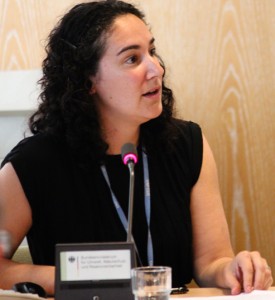
In a landmark case (Urgenda v. Netherlands), the Dutch advocacy group Urgenda will argue today that the Dutch government’s emissions reduction target is not adequate to prevent dangerous climate change and, as a result, poses a threat to human rights in the Netherlands and in countries around the world. Specifically, Urgenda claims that the Dutch government’s failure to take ambitious action threatens the rights to life and to private and family life, as established under international human rights law and as applied by statute under Dutch law.
This argument is well supported by law and science. The international community has recognized that climate change is one of the greatest human rights challenges of our time, yet the individual and collective actions taken by countries such as the Netherlands do not reflect the sense of urgency that science dictates. This is a critical moment—the Netherlands and countries around the world must be held to account to protect the right to a safe climate in the name of youth and future generations.
climate change is one of the greatest human rights challenges of our time, yet the individual and collective actions taken by countries such as the Netherlands do not reflect the sense of urgency that science dictates. This is a critical moment—the Netherlands and countries around the world must be held to account to protect the right to a safe climate in the name of youth and future generations.
 This case is premised, in part, on the human rights obligations of the Dutch government to reduce carbon emissions at a level that will help limit warming to below 2 degrees C as a means to protect the rights of people and communities within its borders. However, it is important to note that the Netherlands (and other countries) also have obligations to prevent extraterritorial harms resulting from contributions to climate change. For example, all countries must take necessary measures to ensure that non-state actors—including the major carbon producers such as Shell—do not threaten the human rights of people and communities beyond their borders.
This case is premised, in part, on the human rights obligations of the Dutch government to reduce carbon emissions at a level that will help limit warming to below 2 degrees C as a means to protect the rights of people and communities within its borders. However, it is important to note that the Netherlands (and other countries) also have obligations to prevent extraterritorial harms resulting from contributions to climate change. For example, all countries must take necessary measures to ensure that non-state actors—including the major carbon producers such as Shell—do not threaten the human rights of people and communities beyond their borders.
The significance of this case and the role that courts will play in shaping the law on state responsibility for climate change cannot be understated. As stated by Jaap Spier, Advocate-General to the Dutch Supreme Court, “Courts can force countries to adopt effective climate policies. Court cases are perhaps the only way to break through the political apathy about climate change[…] it is just a matter of applying existing law… Judges with the courage to give a ruling on this will one day be applauded…”
While the Dutch climate lawsuit is not the first and certainly not the last of its kind, the world is watching to see if the court will hold the government accountable for its obligations to take urgent climate action and effectively protect our right to a safe climate.
Originally posted on April 14, 2015.
